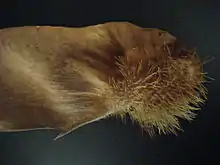Centrolobium
Centrolobium is a Neotropical genus of legume in the family Fabaceae, assigned to the informal monophyletic Pterocarpus clade of the Dalbergieae.[1][2] The genus comprises mostly large trees to 30 m tall, characterised by an abundance of orange peltate glands that cover most parts of the plant, and fruits that are large winged samaras to 30 cm long with a spiny basal seed chamber.[3]
| Centrolobium | |
|---|---|
 | |
| Centrolobium fruit | |
| Scientific classification | |
| Kingdom: | |
| (unranked): | |
| (unranked): | |
| (unranked): | |
| Order: | |
| Family: | |
| Subfamily: | |
| Tribe: | |
| Genus: | Centrolobium Mart. ex Benth. |
| Species | |
|
7; see text. | |
Species
Centrolobium comprises the following species:[4][5][3]
- Centrolobium microchaete (Mart. ex Benth.) H.C. Lima—canarywood, tarara amarilla
- Centrolobium ochroxylum Rudd
- Centrolobium paraense Tul.
- Centrolobium robustum (Vell.) Mart. ex Benth.
- Centrolobium sclerophyllum H.C. Lima
- Centrolobium tomentosum Guill. ex Benth.
- Centrolobium yavizanum Pittier—amarillo de Guayaquil
References
- Lavin M, Pennington RT, Klitgaard BB, Sprent JI, de Lima HC, Gasson PE (2001). "The dalbergioid legumes (Fabaceae): delimitation of a pantropical monophyletic clade". Am J Bot. 88 (3): 503–33. doi:10.2307/2657116. JSTOR 2657116. PMID 11250829.
- Cardoso D, Pennington RT, de Queiroz LP, Boatwright JS, Van Wyk BE, Wojciechowskie MF, Lavin M (2013). "Reconstructing the deep-branching relationships of the papilionoid legumes" (PDF). S Afr J Bot. 89: 58–75. doi:10.1016/j.sajb.2013.05.001.
- Pirie, Michael D.; Klitgaard, Bente B.; Pennington, R. Toby (2009). "Revision and Biogeography of Centrolobium (Leguminosae - Papilionoideae)". Systematic Botany. 34 (2): 345–359. doi:10.1600/036364409788606262. ISSN 0363-6445.
- "ILDIS LegumeWeb entry for Centrolobium". International Legume Database & Information Service. Cardiff School of Computer Science & Informatics. Retrieved 10 February 2014.
- USDA; ARS; National Genetic Resources Program. "GRIN species records of Centrolobium". Germplasm Resources Information Network—(GRIN) [Online Database]. National Germplasm Resources Laboratory, Beltsville, Maryland. Archived from the original on 24 September 2015. Retrieved 10 February 2014.
| Wikispecies has information related to Centrolobium. |
| Wikimedia Commons has media related to Centrolobium. |
This article is issued from Wikipedia. The text is licensed under Creative Commons - Attribution - Sharealike. Additional terms may apply for the media files.